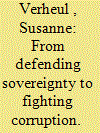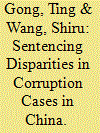| Srl | Item |
| 1 |
ID:
178256


|
|
|
|
|
| Summary/Abstract |
In this article, I examine the shifting language of debates over law and justice in Zimbabwe in the run-up to, and following, the November 2017 coup. I argue that the rhetoric Zimbabwe African National Union–Patriotic Front (ZANU–PF) drew upon to secure its authority and negotiate legitimacy through law, shifted from a focus of ‘sovereignty’ and ‘protection’, to one of battling ‘corruption’ and ‘criminality’. At the same time, there remained a consistency in the manner that the legal system was used to target a select part of the country’s population, those opposed to ZANU–PF and its vision for the future.
|
|
|
|
|
|
|
|
|
|
|
|
|
|
|
|
| 2 |
ID:
163663


|
|
|
|
|
| Summary/Abstract |
In China, the dramatic increase in the number of trials and convictions of corrupt officials leads to the question of how they were sentenced and by what criteria. The puzzle is, in particular, to what extent judicial discretion plays a role in sentencing corrupt officials and, if judicial discretion does exist, how the discretionary power is exercised. This article addresses these questions based on 7304 court judgments in 2014–15, which were obtained from the official website of the Supreme People’s Court. The authors’ analysis reveals strong evidence of the presence of a high level of judicial discretion and considerable inconsistency in court judgments. This article further explores the possible explanations for sentencing disparities in corruption cases to show how extra-judicial factors may influence judicial decisions.
|
|
|
|
|
|
|
|
|
|
|
|
|
|
|
|